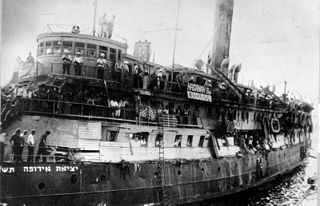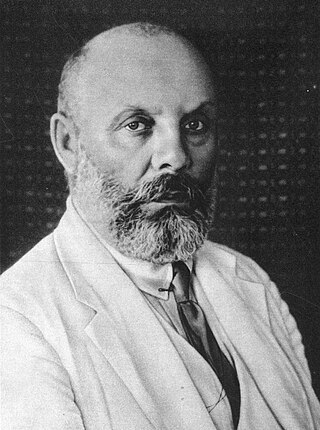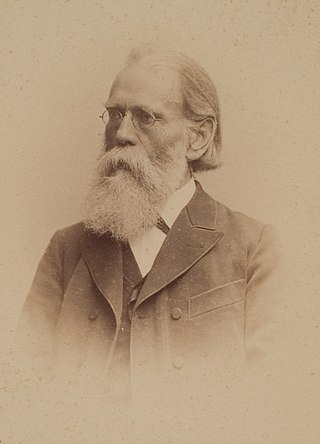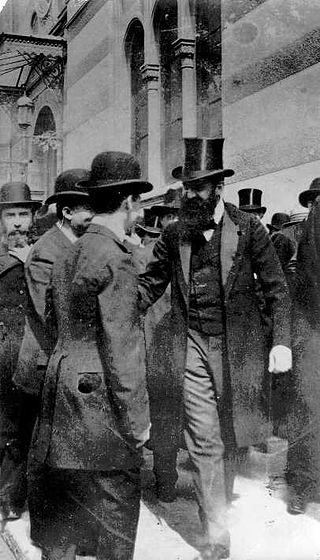
Max Simon Nordau was a Zionist leader, physician, author, and social critic.

The Jewish aspiration to return to Zion, generally associated with divine redemption, has suffused Jewish religious thought since the destruction of the First Temple and the Babylonian exile.

The World Zionist Organization, or WZO, is a non-governmental organization that promotes Zionism. It was founded as the Zionist Organization at the initiative of Theodor Herzl at the First Zionist Congress, which took place in August 1897 in Basel, Switzerland. The goals of the Zionist movement were set out in the Basel Program.

Nathan Birnbaum was an Austrian writer and journalist, Jewish thinker and nationalist. His life had three main phases, representing a progression in his thinking: a Zionist phase ; a Jewish cultural autonomy phase, which included the promotion of the Yiddish language; and a religious phase, when he turned to Orthodox Judaism and became staunchly anti-Zionist.

Max Isidor Bodenheimer was a lawyer and one of the main figures in German Zionism. An associate of Theodor Herzl, he was the first president of the Zionist Federation of Germany and one of the founders of the Jewish National Fund. After his flight in 1933 from Nazi Germany, and a short sojourn in Holland, he settled in Palestine in 1935.

The Zionist Congress was established in 1897 by Theodor Herzl as the supreme organ of the Zionist Organization (ZO) and its legislative authority. In 1960 the names were changed to World Zionist Congress and World Zionist Organization (WZO), respectively. The World Zionist Organization elects the officers and decides on the policies of the WZO and the Jewish Agency, including "determining the allocation of funds." The first Zionist Congress was held in Basel, Switzerland in 1897. Any Jew over age 18 who belongs to a Zionist association is eligible to vote, and the number of elected delegates to the Congress is 500. 38% of the delegates are allocated to Israel, 29% to the United States of America, and 33% to the remainder of the countries of the Diaspora. In addition there are about 100 delegates which are appointed by International Organizations affiliated with WZO.

Menachem Ussishkin was a Russian-born Zionist leader and head of the Jewish National Fund.

Central Zionist Archives is the official archive of the institutions of the Zionist Movement: the World Zionist Organization, the Jewish Agency, the Jewish National Fund, and Keren Hayesod/the United Israel Appeal as well as the archives of the World Jewish Congress. The archive is located in West Jerusalem adjacent to Binyanei HaUma.

Zvi Hermann Schapira, or Hermann Hirsch Schapira, was a Lithuanian rabbi, mathematician at the University of Heidelberg, and Zionist. He was the first to suggest founding a Jewish National Fund for the purchase of land in Palestine.

The First Zionist Congress was the inaugural congress of the Zionist Organization (ZO) held in the Stadtcasino Basel in the city of Basel on August 29–31, 1897. Two hundred and eight delegates and 26 press correspondents attended the event. It was convened and chaired by Theodor Herzl, the founder of the modern Zionism movement. The Congress formulated a Zionist platform, known as the Basel program, and founded the Zionist Organization.

Oskar Adolf Marmorek was a Galician-born Austro-Hungarian architect and Zionist.
As an organized nationalist movement, Zionism is generally considered to have been founded by Theodor Herzl in 1897. However, the history of Zionism began earlier and is intertwined with Jewish history and Judaism. The organizations of Hovevei Zion, held as the forerunners of modern Zionist ideals, were responsible for the creation of 20 Jewish towns in Palestine between 1870 and 1897.

Die Welt was a weekly newspaper founded by Theodor Herzl in May 1897 in Vienna. It was designed to promote Zionism and boldly proclaimed itself to be a Judenblatt (Jew-paper). From 1897 to 1914 it was the principal organ of the Zionist movement. From 1897 to 1900, the paper was edited by Erwin Rosenberger.
Samuel Pineles was a Jewish Romanian philanthropist and Religious Zionist activist. He was the driving force behind the 1881 Romanian Zionist meeting in Focșani. He was the president and secretary of the Central Committee to Settle the Land of Israel and Syria and was active in Hovevei Zion in Romania.

Maxa Nordau was a French painter. She was from a Jewish family and was the daughter of Max Nordau, a prominent Zionist. She often travelled in the Middle East, and many of her paintings are portraits or nudes of Arab or Jewish women whom she met there.

The Second World Zionist Congress met in Basel, Switzerland on 28 August 1898. and was the second meeting of the Zionist Organisation. The World Zionist Congress brought together delegates from across the world to raise funds, lobby support and create the institutions that would one day form the modern day Jewish State known as Israel, which was established in 1948. The Congress met every year from 1897 to 1901. The main focus of the Second Congress, as set out by its chair, Theodor Herzl, was to engage with Jewish communities in the diaspora and encourage them to adopt Zionism.

The Sixth Zionist Congress was held in Basel, opening on August 23, 1903. Theodor Herzl caused great division amongst the delegates when he presented the "Uganda Scheme", a proposed Jewish colony in what is now part of Kenya.

Jacob Fishman was a Polish-born Jewish American Yiddish newspaper editor and Zionist.















